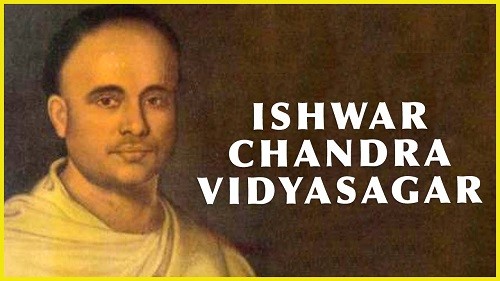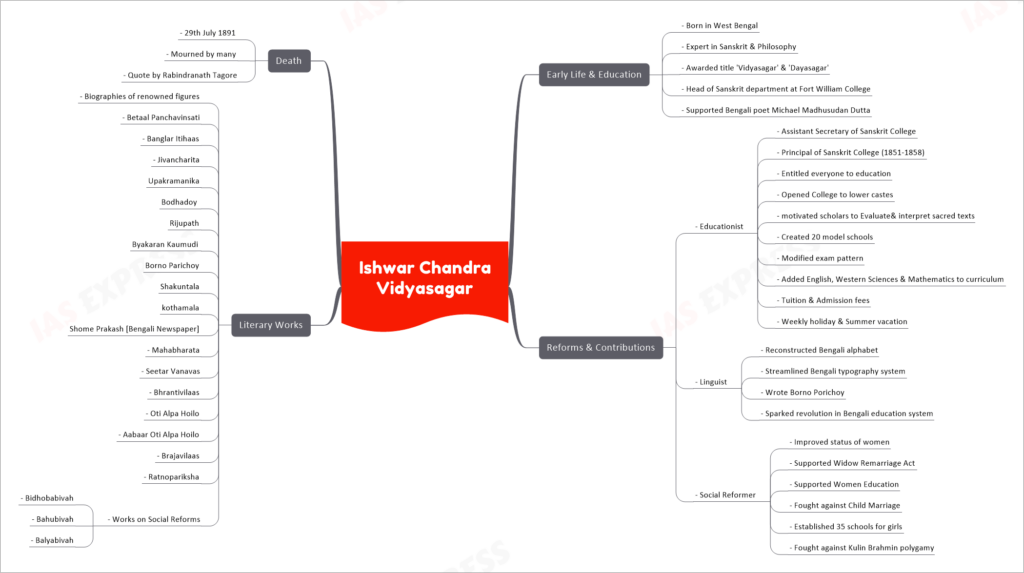Ishwar Chandra Vidyasagar – Important Personalities of Modern India

Prelims Sureshots » Important Personalities of Modern India
Ishwar Chandra Vidyasagar was a renowned writer, scholar and champion of humanity who brought about a revolution in the educational system of Bengal. He is regarded as one of the most influential figures in the Bengal renaissance, carrying on the reforms initiated by Raja Rammohan Roy. His efforts to modernise and simplify Bengali prose earned him the title of “Father of Bengali Prose” and he rationalised and simplified the Bengali alphabet and type, which had remained unchanged since 1880.
This topic of “Ishwar Chandra Vidyasagar – Important Personalities of Modern India” is important from the perspective of the UPSC IAS Examination, which falls under General Studies Portion.
Early Life and Education
- Ishwar Chandra Bandyopadhyay was born on 26th September, 1820 in West Bengal.
- After demonstrating his expertise in Sanskrit and philosophy, he was given the title ‘Vidyasagar’, which translates to ‘Ocean of Knowledge’ in Hindi.
- In 1839, he passed his law examination with success. In 1841, he graduated from Sanskrit College in Kolkata, having mastered Sanskrit grammar, literature, dialectics, Vedanta, Smruti, and Astronomy.
- At 21, he became the head of the Sanskrit department at Fort William College.
- He aided the Bengali poet Michael Madhusudan Dutta in his relocate from France to England to study law, then later supported his return to India, where he composed some of the most renowned literary works in the Bengali language.
- In recognition of his altruism, Michael Madhusudan bestowed the name ‘Dayasagar’ or ‘Ocean of Generosity’ upon him.
Reforms and Contributions
As an Educationist
- In 1846, Vidyasagar was appointed as the Assistant Secretary of the Sanskrit College and within a year, he made several modifications to the education system.
- As the Principal of the Sanskrit College from 1851 to 1858, he implemented unprecedented reforms in both administration and education.
- Vidyasagar held the opinion that regardless of caste or gender, everyone was entitled to education, something that had no concept at the time.
- He even opened up the College to people from lower castes.
- Additionally, he motivated scholars to evaluate and interpret ancient sacred texts for contemporary use.
- He created 20 model schools in Hooghly, Midnapore, Burdwan and Nadia.
- He personally supervised the schools, hired teachers and designed their syllabus.
- He modified the exam pattern by introducing monthly exams in lieu of annual ones, and added English, Western Sciences and Mathematics to the curriculum.
- He also introduced admission and tuition fees, along with a weekly holiday on Sundays and a summer vacation in the months of May and June.
- Ultimately, he sparked a revolution in the Bengali education system by modifying the way Bengali language was written and taught.
As a Linguist
- Vidyasagar is renowned for his reconstruction of the Bengali alphabet.
- He streamlined the Bengali typography system into a set of 12 vowels and 40 consonants, removing Sanskrit phonemes.
- His book ‘Borno Porichoy’, meaning ‘Introduction to the Letter’, is still utilised as the introductory book for learning the Bengali alphabet.
- He was a major figure in the Bengal Renaissance, a cultural, social, intellectual and artistic movement that occurred in Bengal from the 19th century to the early 20th century.
- During the Renaissance period, there was an immense surge of Bengali literature, with Vidyasagar leading the way.
- He wrote roughly ten books on Bengal’s history and literature, which have all been deemed classics in our current era.
As a Social Reformer
- Vidyasagar was a pioneer in improving the status of women in India.
- After studying ancient texts, he realized that the disadvantaged position of Indian women was not based on religious teachings and was rather a result of existing power structures.
- With this knowledge, he launched a tireless campaign to pass the Widow Remarriage Act in 1856 and actively encouraged his son Narayan Chandra Bandyopadhyaya to marry a widow in order to generate public support for the act.
- Instead of creating new systems, Vidyasagar sought to transform society from within, and as a result, widow remarriage was accepted in the conservative Hindu Brahmin society of Bengal.
- Vidyasagar was also a strong advocate of women education and vehemently opposed the practice of child marriage.
- To further this, he established 35 schools for girls all over Bengal, the most important being the Metropolitan School of Calcutta.
- He also fought against the Kulin Brahmin polygamy, a practice wherein men married as many as eighty women, often elderly men marrying young girls and even children. Unfortunately, these widows were often forced out of their homes, leading to a life of destitution and misery.
- Ishwar Chandra Vidyasagar was a man who was far ahead of his time. His legacy and contribution to the upliftment and empowerment of women, as well as his tireless efforts for ‘nari shiksha’, remain unparalleled.
Literary works
- Iswar Chandra Vidyasagar was a renowned scholar who wrote biographies of many renowned figures throughout history, in order to inspire the younger generations with examples of strength, dedication, integrity, patience, perseverance, courage, determination and philosophy. Some of
- His works include: Betaal Panchavinsati (1847), Banglar Itihaas (1848), Jivancharita (1849), Bodhadoy (1851), Upakramanika (1851), Rijupath (1851-52), Byakaran Kaumudi (1853), Borno Parichoy (1854), Shakuntala (1854), kothamala (1856), Shome Prakash [Bengali Newspaper] (1858), Brant’ (1858), Mahabharata (1860), Seetar Vanavas (1860), Bhrantivilaas (1869), Oti Alpa Hoilo (1873), Aabaar Oti Alpa Hoilo (1873), Brajavilaas (1884), and Ratnopariksha (1886).
- Vidyasagar’s works on social reforms include Bidhobabivah (1855), concerning the rights of widows to remarry; Bahubivah (1871) against polygamy, and Balyabivah (1871) against child marriage.
Death
The passing of Ishwar Chandra Vidyasagar on 29th July 1891 marked a great loss to the Bengali people. This renowned scholar, academician and reformer had been a great influence on the lives of many.
His passing was mourned by many, including Rabindranath Tagore, who famously said, “One wonders how God, in the process of producing forty million Bengalis, produced a man!”


